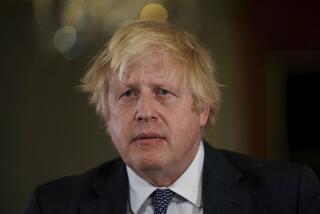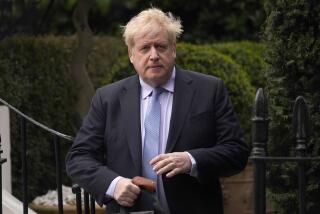If Doubts Persist, Damage Could Be Irreparable : Scandal Erodes Thatcher’s Power
- Share via
LONDON — There is a growing conviction here that Prime Minister Margaret Thatcher may be permanently damaged by a major scandal that continues to haunt her.
Veteran observers across the breadth of British politics are now convinced the damage will last for awhile and inhibit her leadership. If she is unable to squelch the lingering doubts about her personal role in the unseemly scandal, that damage could be permanent and irreparable.
Even members of Parliament from within her own Conservative Party who recently rallied to Thatcher with an important vote of support in the House of Commons now talk of the scandal as a watershed in her prime ministership and a political blow from which she will never recover.
Dispute Mushroomed
The scandal began in apparently harmless differences within her Cabinet last November over the future of a financially troubled defense contractor, the Westland company, a helicopter maker. But it quickly mushroomed into an embarrassing confrontation that led directly to the resignation of two senior Cabinet ministers and has cast doubt about Thatcher’s competence and credibility.
While there appears to be no immediate threat to her position as prime minister, if events should go badly for her in the coming months, pressure would almost certainly mount among leading Conservatives for her to step aside as party leader, a possibility virtually unthinkable two months ago.
This sudden erosion of power for a leader many consider one of the most dominant, determined British prime ministers in this century carries widespread implications.
Thatcher, who has dominated her Cabinet and her party, and has changed the terms of political debate in the country through determination and the force of her personality, has suddenly been placed on the defensive. She will now be forced to be more cautious, to move more slowly and to consult more thoroughly, according to those assessing the effects of the affair.
Instincts Questioned
Party colleagues, who had come to respect her political instincts and believed that if all else failed, she would win through pure force of will, now privately question those instincts, and the results of her perseverance.
One Conservative member of Parliament has called for Thatcher to step down as party leader before the next election.
“The time has come when we should be thinking in terms of choosing another leader,” said Antony Meyer, who has criticized Thatcher’s policies on previous occasions.
More disturbing for Thatcher is a mounting disquiet among members of Parliament loyal to her. Thirty Conservative MPs voted against her recommendation on a monetary matter in Parliament on Feb. 3, and the following day she was assailed from both parties while answering parliamentary questions on matters unrelated to the scandal.
Then, on Feb. 6 she was forced to abandon a plan to sell state-owned Austin Rover auto production facilities to Ford Motor Co. as part of her denationalization program. Heavy opposition had developed in the Cabinet and among other Conservative members of Parliament.
Image Suffers
Her public image as a trusted, no-nonsense leader has also suffered.
A nationwide Harris poll conducted last week indicated that 56% of the British public did not believe her statements about the Westland affair. A British Broadcasting Corp. survey of 500 viewers the morning after her statement found only 20% felt she had told “the whole truth.”
“The balance of power in the medium and even the long term has shifted against her,” said Anthony King, professor of government at Essex University and a respected political commentator.
Less clear is the impact the scandal will have on her international stature, which has grown steadily with her domestic successes. She is one of the longest serving heads of government in the Western alliance and the European leader considered to be closest to President Reagan.
Confidential Letter
Much of Thatcher’s problems centers on the involvement of her office in the surreptitious disclosure of a highly sensitive, confidential letter connected to the affair.
The letter, from the country’s second-ranking law officer, Patrick Mayhew, to then-Defense Secretary Michael Heseltine, accused Heseltine of misrepresenting the facts in presenting his point of view in the dispute.
Heseltine and Trade and Industry Secretary Leon Brittan subsequently resigned over the issue, and two of Thatcher’s closest aides were linked with the decision to leak the letter. The prime minister’s opponents contend that Thatcher and Brittan agreed to leak the letter, hoping it would discredit Heseltine, her opponent in the unseemly Cabinet dispute over whether an American or a European firm should bail out financially troubled Westland.
Westland shareholders Wednesday chose the American firm, Sikorsky.
Disclosing the existence, let alone the contents, of a letter from such a senior law officer to a Cabinet minister without the author’s permission is a major breach of government procedure.
Careful Statement
Thatcher had hoped that a carefully worded 20-minute statement to Parliament on Jan. 27 would satisfy her critics that she had not authorized the leak and was not personally involved in it. Conservative whips ensured near-unanimous backing in the subsequent vote of support they hoped would finally end the uproar.
Even Heseltine, who had combined his resignation last month with a strong personal attack on Thatcher’s domineering, unbending style of leadership, praised her statement, which included expressions of regret for the way in which the document was leaked.
But it quickly became apparent that her explanation left serious doubts, not just with opposition members of Parliament, but with the country’s leading political commentators and, more significantly, with a majority of the general public.
While she claimed that she did not authorize the leak, her explanation that the involvement of two of her most senior, experienced aides was the result of a “misunderstanding” has strained her credibility.
Her insistence that she was also unaware for nearly two weeks that Brittan, her closest Cabinet ally in the dispute, had authorized the leaks seemed difficult to accept, especially from a prime minister renowned for her attention to detail.
Growing Skepticism
Thatcher’s repeated refusal to elaborate on her statement has only enhanced general skepticism that it was far from a full, open explanation of events.
“I’m not saying she didn’t tell the truth in Parliament, I’m saying she didn’t tell the whole truth in Parliament,” said John Smith, a former Labor Party minister.
Thatcher’s position has been weakened further by a series of embarrassing developments. Among them:
--In an angry confrontation with a parliamentary committee assigned to investigate events surrounding the Westland affair, Brittan refused to answer questions relating to the leaked letter. Together with Thatcher’s refusal to permit senior civil servants involved in the leak to testify before the same committee, Brittan’s performance has increased public skepticism.
The committee, seven of whose 10 members are Conservatives, called her action a “gross affront” to Parliament.
--Last Thursday, Heseltine stirred new controversy by testifying that document summaries related to the affair handed over to the committee by Brittan’s former ministry were incomplete, prompting immediate demands by the committee for the full documents.
--The same day, Alan Bristow, who developed his own successful helicopter company and had publicly opposed the Thatcher-Brittan position in the affair, claimed he had been offered a knighthood as a bribe if he withdrew his opposition. Thatcher quickly denied that any member of her government had been involved in the alleged incident.
More to Read
Sign up for Essential California
The most important California stories and recommendations in your inbox every morning.
You may occasionally receive promotional content from the Los Angeles Times.













